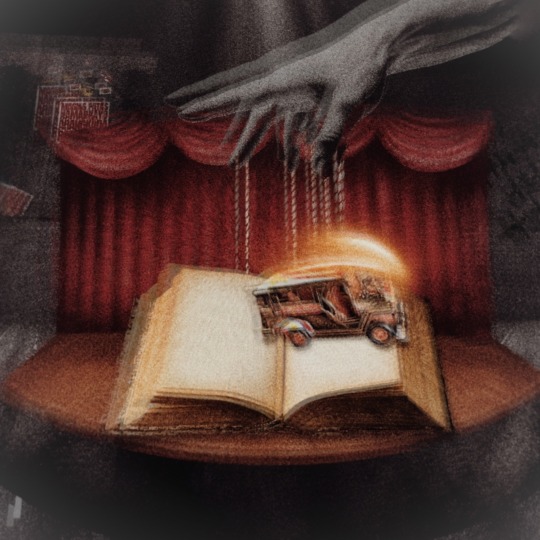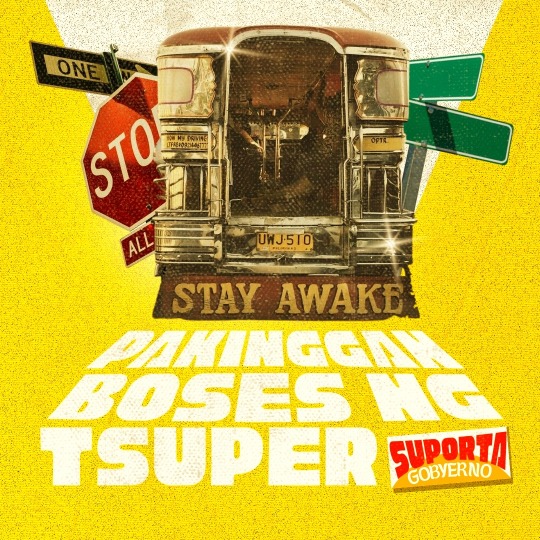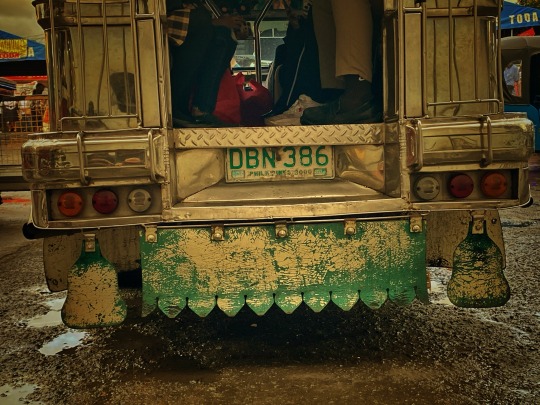muling pakinggan ang istorya nila, mula kalsada hanggang sining.
Don't wanna be here? Send us removal request.
Text

LARUAN
It breaks my heart to see how our jeepney drivers, people who have carried generations of Filipinos through their daily lives, treated like they don’t matter. They are one of the workers who endure heat, traffic, and long hours just to earn enough to bring food to their families. However, despite their hard work, they’re often overlooked, treated as obstacles to progress rather than the backbone of our transportation system. These are not just drivers, they are parents trying to send their children to school, grandparents still working to support their families, and individuals with stories, dreams, and dignity. Every day, they navigate the same streets we do, but with a heavier burden, uncertainty about their future, fear of losing their livelihood, and the pain of being unheard. We cannot keep turning a blind eye. They deserve more than pity, they deserve justice, respect, and a seat at the table in the conversations that shape their fate.
1 note
·
View note
Text

NASA POSTE
It has never been right the way jeepneys symbols of our culture and lifelines of the masses have been made to step aside in the name of so-called modernization. These people have driven communities for decades, hauling pupils, workers, and families through their everyday grind. But today, they're made to feel like old-timey rubbish, and the drivers at the wheel are made to look after themselves with very little assistance and even less sympathy. Most of them are not able to pay the high demands of modernization, but rather than providing genuine solutions, the system appears to want to eliminate them. It's not about replacing the vehicles it's about replacing the lives. This is not a transport problem, it's a people problem. The struggle to save jeepneys on the road is a struggle to save livelihoods, culture, and dignity.
2 notes
·
View notes
Text

BOSES BUSINA
For too long now, jeepney drivers have been drowned out by policy decisions made without them in consideration. The same individuals who have tirelessly served the public during rain, heat, and hardships have only been afforded a partial seat at the table when decisions on their future are being made. They are not merely drivers, they are mothers, fathers, and breadwinners with strong roots in our communities. Their voices need to be heard, their struggles recognized, and their rights defended. We cannot create a better future by silencing those who've driven us forward for so long. It's time to listen. Not merely with ears, but with action and compassion.
1 note
·
View note
Text
#BYAHEBAGO
Are you someone who travels to work in the Philippines each day? If so, then this might sound familiar to you.
Daily travel to work can be annoying because of the traffic jams, heat, and crowds. This might not be a problem for many people. It varies from individual to individual across the board. This is the individual reason as to why the government proposed the overall idea for modernized or electronic jeepneys. But, is that really the answer to it?
For me, traveling from my home to school requires 90 minutes, and this travel method usually feels very tiring. Notwithstanding the full capacity, people still attempt to fit inside. This is not only for jeepneys but also tricycles and trains across the country. Can this be solved? When? Is it even possible?
Studies have highlighted that many traditional jeepneys are perceived as uncomfortable and unsafe. A mixed-methods research study found that commuters view jeepneys as non-inclusive and unsafe due to design inaccuracies. The study suggests that addressing these issues could enhance passenger comfort and safety.
A comfortable and well-organized system for most transportation is somewhat necessary, as it is also connected with the safety and security for each commuter. That’s precisely why we must be heard loud and clear by others, and let’s actively travel toward change for the better.
References;
https://animorepository.dlsu.edu.ph/cgi/viewcontent.cgi?article=1812&context=conf_shsrescon&utm_source=chatgpt.com

0 notes
Text

Limos o Utos?
A child should study, not work. If you are a commuter, you would understand this well. "Barya lang po pangkain", a phrase I often hear as I ride the jeep. It reflects the reality of children who can be found across the street, seeking any amount of money just to survive. Poverty? It kills their dreams, robbing them of the opportunity to go to school and pursue a brighter future.
Every day, these young people deals with the problem that force them to abandon their education in favor of survival. It’s really sad to see young kids with so much potential reduced to begging for spare change. Instead of being in school and learning, they’re struggling just to meet their basic needs. Education should be their main focus, but for many, day-to-day survival comes first. These children deserve a chance to learn and grow, and it’s important that we help them get the support they need to build a better future.
Child labor remains a pressing issue in the Philippines, with numerous studies highlighting its prevalence and impact. According to the Philippine Statistics Authority (PSA), the number of working children aged 5 to 17 was estimated at 1.09 million in 2023, a decrease from 1.48 million in 2022.
Piso PARA sa Pangarap.
Reference;
https://psa.gov.ph/statistics/labor-force-survey/child-labor-statistics?utm_source=chatgpt.com
1 note
·
View note
Text

Transportasyon o Polusyon?
Beep Beep Beep!
As soon as I boarded the jeep, I dulge off and had a vivid dream about a road, a protest, and people fighting for their rights and privileges. I saw a slogan: '#NoToJeepneyPhaseout.' This seemed familiar, and I wondered, 'Did I ride a jeep into modernization or to Lyceum?’ I'm sure many of you have seen this quote or rally on the news or online. Personally, I'm against the phaseout of traditional jeepneys. There are several reasons for my stance.
According to the Climate Adaptation Platform, the popularity of jeepneys comes at a cost to the environment and public health. These vehicles are often poorly maintained to keep fares low and accessible to more people. As a result, they emit harmful pollutants, compromising air quality in urban areas across the Philippines. On the other hand, jeepneys are a vital mode of transportation for commuters like me. While they may not be the most convenient option, they are one of the cheapest ways to get around.
Hanggang dito na lamang. Para na po!
References:
https://climateadaptationplatform.com/cleaner-and-modern-public-transportation-in-the-philippines/
1 note
·
View note
Text

JUSKO PO, TRAFFIC!
The clock struck it’s 5 in the morning, I have to prepare on my way to school. My class starts usually at 8:00 am. Yes, indeed tiring to wakeup so early just to get at the school on time. It is because, I am in the Philippines and the traffic here is insane. They say traffic is no longer a valid excuse and I somehow agreed on that. We are living for lot of decades where traffic is present in every times. But when will be able to overcome with this? A study conducted by the Washington University, (2012) in St. Louis found that driving or commuting along congested roads for long time can lead to chronic stress. Personally, I have been experiencing stress due to traffic. It is undeniable that it causes negative impacts on us and yet the answer is still unknown.
References;
Hoehner, Prev. (2012)
https://pubmed.ncbi.nlm.nih.gov/22608372/
1 note
·
View note
Text

Pinuno o Basura?
The 2025 country election is fast approaching, and we often see various political paraphernalia and posters around the streets. Has it even crossed our minds what the purpose of these materials is beyond simply promoting or campaigning for politicians? It is undeniable that this material has been effective in informing us about potential leaders, according to the article of Minda News, mounting amid the election season as national and local candidates in the May 2022 elections invest heavily in non-biodegradable campaign materials like banners and tarpaulins, a Davao City-based environmental group said. However, it also carries a negative impact for bigger reasons. An article by Inquirer also prove that “There is no denying the excessive use of these materials can clutter the streets, creating an unattractive and chaotic environment. By advocating for clean and orderly streets, we can ensure a visually appealing and serene atmosphere that allows citizens to focus more on discharging their civic duty to vote.”
Looking at the broader perspective, right after the election, some politicians promptly remove their tarpaulins. However, it is undeniable that some leave their tarpaulins hanging, resulting in an unsightly appearance in our environment. Additionally, as long as these materials remain, there is a chance they may eventually become waste, and studies show that tarpaulin materials are not easily decomposed. According to, Recycle Nation “it takes longer for plastics to decompose than something like a paper towel or slice of bread.” This can harm the environment, reflecting a practice that is neither sustainable nor healthy.
Although our leaders are the hope of tomorrow, it is essential that they are held accountable and remain mindful of the impact of their actions after the election. There are numerous ways to approach this sustainably, rather than leaving these materials to hang until the next election. For instance, some tricycle and jeepney drivers could utilize these tarpaulins, allowing them to be repurposed and reducing waste.
This coming election let us not just vote but also be sustainable for the future.
References;
Colina, A. (2022)
https://mindanews.com/top-stories/2022/03/plastic-waste-problem-worsens-amid-election-season/
Tamayo, R. (2023)
https://opinion.inquirer.net/167781/regulate-use-and-disposal-of-election-campaign-materials/amp
Farnsworth, T. (2020)
https://recyclenation.com/2020/08/surprising-facts-tarps-and-other-plastics-take-longer-to-decompose-than-you-might-imagine/
2 notes
·
View notes


